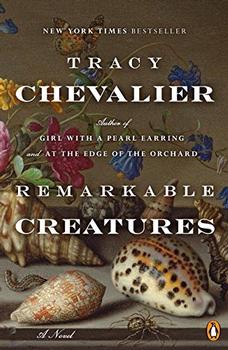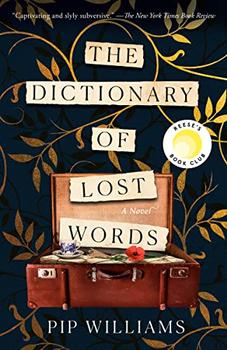Summary | Excerpt | Reading Guide | Reviews | Beyond the book | Read-Alikes | Genres & Themes | Author Bio

A voyage of discoveries, a meeting of two remarkable women, and an extraordinary time and place enrich bestselling author Tracy Chevalier's enthralling new novel.
From the moment she's struck by lightning as a baby, it is clear that Mary Anning is marked for greatness. On the windswept, fossil-strewn beaches of the English coast, she learns that she has "the eye"—and finds what no one else can see. When Mary uncovers an unusual fossilized skeleton in the cliffs near her home, she sets the religious fathers on edge, the townspeople to vicious gossip, and the scientific world alight. In an arena dominated by men, however, Mary is barred from the academic community; as a young woman with unusual interests she is suspected of sinful behavior. Nature is a threat, throwing bitter, cold storms and landslips at her. And when she falls in love, it is with an impossible man.
Luckily, Mary finds an unlikely champion in prickly Elizabeth Philpot, a recent exile from London, who also loves scouring the beaches. Their relationship strikes a delicate balance between fierce loyalty, mutual appreciation, and barely suppressed envy. Ultimately, in the struggle to be recognized in the wider world, Mary and Elizabeth discover that friendship is their greatest ally.
Remarkable Creatures is a stunning novel of how one woman's gift transcends class and social prejudice to lead to some of the most important discoveries of the nineteenth century. Above all, is it a revealing portrait of the intricate and resilient nature of female friendship.
ONE
Different from all
the rocks on the beach
Lightning has struck me all my life. Just once was it real. I shouldn’t remember it, for I was little more than a baby. But I do remember. I was in a field, where there were horses and riders performing tricks. Then a storm blew in, and a woman—not Mam—picked me up and brought me under a tree. As she held me tight I looked up and saw the pattern of black leaves against a white sky.
Then there was a noise, like all the trees falling down round me, and a bright, bright light, which was like looking at the sun. A buzz run right through me. It was as if I’d touched a hot coal, and I could smell singed flesh and sense there was pain, yet it weren’t painful. I felt like a stocking turned inside out.
Others begun pulling at me and calling, but I couldn’t make a sound. I was carried somewhere, then there was warmth all round, not a blanket, but wet. I knew where I was because it was water and I knew water - our ...
Exploiting a beloved historical icon in fiction is risky business, but Chevalier dives in with gusto. Mary Anning, her subject in Remarkable Creatures, is a rock star to the natural history museum set, a feminist hero dangled before little girls to get them excited about science and to prove that paleontology is not just for boys... Chevalier takes a sensational figure (and Mary Anning was a real celebrity in her own day) and focuses on the quiet, unsensational part of the story. In this way she achieves something radical - a new way of imagining the inner lives of women who were remarkable in their day, not as spectacular rebels, but as original individuals stubbornly pursuing what interests them. I had expected to come away from the novel with some feminist insight into Mary Anning, and what I got was even more subtle and surprising...continued
Full Review
 (664 words)
(664 words)
(Reviewed by Jennifer G Wilder).
he cliffs and beaches of Lyme Regis, in Dorset on the south coast of England, are fertile hunting grounds for creatures who lived in what were equatorial seas in the early Jurassic period, around 190 million years ago. Here is a look at some of the fossil types Mary Anning discovers in Remarkable Creatures:
 Ammonites are distant relatives of modern-day cephalopods such as octopus, squid, or chambered nautilus, which they most resemble because of their whorled shell. They grew quickly over a life-span of roughly two years. Ammonite fossils from Lyme Regis can range from the size of a fingertip to about 2 feet in diameter.
Ammonites are distant relatives of modern-day cephalopods such as octopus, squid, or chambered nautilus, which they most resemble because of their whorled shell. They grew quickly over a life-span of roughly two years. Ammonite fossils from Lyme Regis can range from the size of a fingertip to about 2 feet in diameter.  The name "ammonite" comes from Greek version of the Egyptian god Ammon, who is often depicted with ribbed ram's ...
The name "ammonite" comes from Greek version of the Egyptian god Ammon, who is often depicted with ribbed ram's ...

If you liked Remarkable Creatures, try these:

by Pip Williams
Published 2022
In this remarkable debut based on actual events, as a team of male scholars compiles the first Oxford English Dictionary, the daughter of one of them decides to collect the "objectionable" words they omit.

by Anna Freeman
Published 2016
The Crimson Petal and the White meets Fight Club: A page-turning novel set in the world of female pugilists and their patrons in late eighteenth-century England.




Read the best books first...
Click Here to find out who said this, as well as discovering other famous literary quotes!